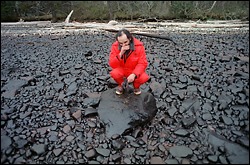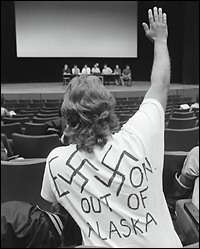 |
 |
 |
| Your account | Today's news index | Weather | Traffic | Movies | Restaurants | Today's events | ||||||||
|
September 24, 1989
Sprawling in size, breathtaking in beauty, Alaska struggles with its soul as it tries to balance opportunity and the environment in the wake of the Exxon Valdez
Six weeks after the grounding of the Exxon Valdez, Kelly Weaverling
came home to Perry Island.
The wild, untouched lagoon where they camped had no name. So they called it Day Care Cove, for its populations of juvenile seals and sea otters. Weaverling's wants were simple: "Nice and quiet, not too much fishing activity, but plenty of sea otters and a family of seals to keep you company." "It always," he said, "felt so good to get here." Weaverling found his way to Alaska in the usual way, which is to say, an unusual way. After years in Europe he returned to the States, hitchhiked to Seattle, and when a promised job fell through, exchanged the last of his money — 50 Swiss francs — for a one-way ticket to Anchorage. He never came back.
In Prince William Sound, Weaverling found the most beautiful
place he had ever seen. Alaskan oil helped give him the money to
explore it. A graphic-arts business he and his wife opened in Anchorage
initially thrived so well in the oil-rich economy that it gave them
four months off each summer to camp and kayak. Later, when oil prices
plummeted, so did the graphics business. They moved to Cordova, on the
sound, and bought the bookstore.
Weaverling knew Perry Island was in the path of the slick. But there was too much to do. He began to recruit volunteers for the wildlife fleet, a motley band of fishing boats sent forth to pick up dead and dying animals. He became de facto commander of the fleet. He delivered the first oiled birds and otters to Valdez. Finally, a month and a half after the spill, it was time for Weaverling to see for himself what Perry Island might be like. He hitched a ride on a fisherman's rubber raft. He rode silently at the bow as they rounded the end of a narrow, wooded spit into Day Care Cove and slid silently up the cobbled shore. The lagoon smelled like a freshly paved highway. The beach rocks were slimed with black. As Weaverling climbed out and made his way up the cobbles, he struggled to keep his footing. The tide had carried the slick up into the grass at the top of the beach; each pale green blade now wore a uniform band of black. He climbed a low bank and followed a short trail through an ancient hemlock forest, lushly carpeted in moss. Over the years, he and his wife had laid the trail with scraps of driftwood covered with fragments of seine net, giving them the footing to span the boggy earth. He found his way up to the campsite on the spit. From there he could see in both directions — into the lagoon and toward the sound - and in both directions there was blackened beach as far as he could see. 'It's as if someone walked in and poured a barrel of crude in your living room," he said. Then Kelly Weaverling leaned against an ancient, stunted spruce tree and cried. Northwest of Perry Island, Alaska's newest rush was on. Valdez, a town of 3,000, had tripled in size. Hot-dog stands and fast-food joints popped up like entrepreneurial rabbits out of a hat, as did crime. For the first time ever, many Valdezians began to lock their doors. Although the Exxon Corp. refused to advance any money to the Valdez Police Department, its wallet was open for cleanup. Oil spilled was proving even more lucrative than oil shipped. The crowds converging on Valdez were accordingly grateful: "Please, God," went the graffiti in the men's bathroom at the airport, "send us another oil spill. We promise not to piss this one away." Profit-minded Valdezians cheerfully owned up to ripping Exxon off for everything (well, probably not everything) the oil giant was worth. In the next breath, they complained of Exxon accountants who asked uncomfortable questions — such as why someone was charging the company $100 a day for the use of a broken-down station wagon. Cleanup workers lucky enough to get hired on by Exxon earned $2,000 a week. A crew on a cleanup boat ordered fresh garlic and olive oil for their pasta. A supply boat brought dried garlic chips and Wesson oil instead. The crew cook upbraided the supply-boat skipper and sent him back for the real thing. One resident, making his fortune leasing real estate to Exxon, observed this about his home: "Greed," he said, "has taken over this town." Sorrow and greed. For six months now, the Exxon oil spill has provoked both reactions in Alaska. The grief has been shared in the Lower 48: Some of us have chafed at our gluttonous consumption of oil, and others have mourned that one of the world's last pristine places, Prince William Sound, has been so deeply soiled. Why did the Alaskan oil spill so sadden and anger the American people? Its size, biggest in U.S. history, is one reason. Then there is its location. Prince William Sound can sometimes seem so surrealistically beautiful that it must be a place more imagined than real, a land- and seascape from an earlier age. The sheer folly of the accident contributed to public exasperation: The navigational blunder and then a slow-starting, ineffective-seeming cleanup by Exxon mocked the supposed competence and resources of industrial America. That blunder wiped out an estimated hundreds of thousands of birds, thousands of otters and left the sound tarred with a substance that smells like the unventilated back corner of a machine shop. But human and institutional error is nothing new. There was more behind the outrage and dismay. The Exxon Valdez spill came after a year of mounting concern about the environment. Even as the world arms race seemed to slacken, forecasts of a "greenhouse effect" and ozone depletion, long hushed in academic debate, mushroomed into dire forecasts of rising seas and Midwestern deserts. Garbage barges, medical waste on beaches, disastrous forest fires, pesticide scares and battles over deforestation popped up like gremlins that mocked our modern way of life. Washington state's own wilderness beaches were fouled with oil in January, the fourth major spill in the state in five years. Even as workers cleaned the mess, scientists from the Marine Minerals Service were preparing documents needed to lease offshore oil tracts off Washington in 1992. For many, the Exxon spill crystallized that nagging foreboding that our errors may be getting the best of us. In Alaska, the disaster drove home the contradiction between what we idealize and what we are usually willing to settle for. Much of Alaska lives, directly or indirectly, off the nation's need for oil. There seems to be a dual personality to the state's people — a side that loves the state in all its grandeur, and a side that revels in the wealth and opportunity brought by Prudhoe Bay oil. In Alaska, the spill ripped the veil away from that divided nature. "Like Faust, Alaskans came to an agreement with Mephistopheles and it didn't work out," wrote Irving Warner, an Alaska writer, teacher and former state worker, in a letter to England's Manchester Guardian. "Many of us now want our state's soul back. We got our Helen of Troy, but she lied, cheated and is slowly corrupting our lands, waters and us." Alaska contains huge forests of prehistoric trees, and large tracts are ground into pulp to make rayon and cellophane. In Alaska's streams, sounds and straits are some of the world's most productive fisheries. Around its continental shelf lies a potentially prodigious solution to the nation's thirst for transportation fuel, electrical generation, medicines, cosmetics, plastics and miracle fibers refined and manufactured from the hydrocarbon chains of ancient petroleum. As investigations and recriminations continue, there will be a hundred questions about what could or should have been done to prevent the spill or at least lessen its effect. Stronger regulations. Better Coast Guard radar. Tougher inspections. A Legislature willing to stand up to deep-pocket oil lobbyists. Tankers with double, rather than single, hulls. Underlying all the questions, though, is a dilemma more difficult to address: How to live and work in a vast place that depends for wealth on using or harvesting its resources — its fish, its forests, its oil — when they may be fragile, irreplaceable or, at the very least, in conflict. It has been Alaska's fate to have been a long way away, for a long time — a place where people came to get rich and to leave little behind. As the world closes in on the 21st century, Alaska has become a much nearer place. And it may have a new fate, as we globally lose tropical rain forests and uncounted numbers of unique animal and plants species, as we damage the atmosphere, as scientists warn that we may make the planet someday unlivable. It may be Alaska's fate, as the 1980s end, to be one of those places that bring the planet face-to-face with understanding the price it pays for its material success. In the pages ahead, we go to some of the Alaskan places — some dramatic, some quiet and almost hidden — where the dilemma expresses itself. In a rain-sodden village of natives who still carry Russian names and worship in Russian churches, the children of people who helped build the oil pipeline now have helped clean up the spill, even as their ancestors' hunting and fishing grounds were poisoned. On the fishing flats of the Copper River delta, a fishermen nets rich, red sockeye salmon and argues that, while a single fish is worth more than a barrel of Alaska crude, its real value is immeasurably greater even than that. At the north edge of the continent, in the Arctic, where the smallest wheel track can become a permanent part of the landscape, the drillers have erected a great industrial web of steel, concrete and gravel to deliver oil to the pipeline that delivers it to the tankers that carry it to our cities. They drill and build, they say, because while our fantasies idealize the Alaska of Prince William Sound, our lives demand the oil that has stained it. In the end, we will return to Kelly Weaverling, who spent his summers on Perry Island, who made a life of always finding a better place to turn to when times got hard, and who wept, in the hardest of times, in the belief that there is no place left to go.
|
|
||||||||||||||||||||||||||||||||||||
seattletimes.com home
Home delivery
| Contact us
| Search archive
| Site map
| Low-graphic
NWclassifieds
| NWsource
| Advertising info
| The Seattle Times Company

